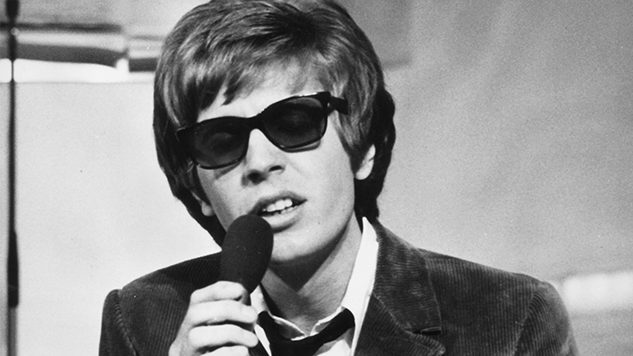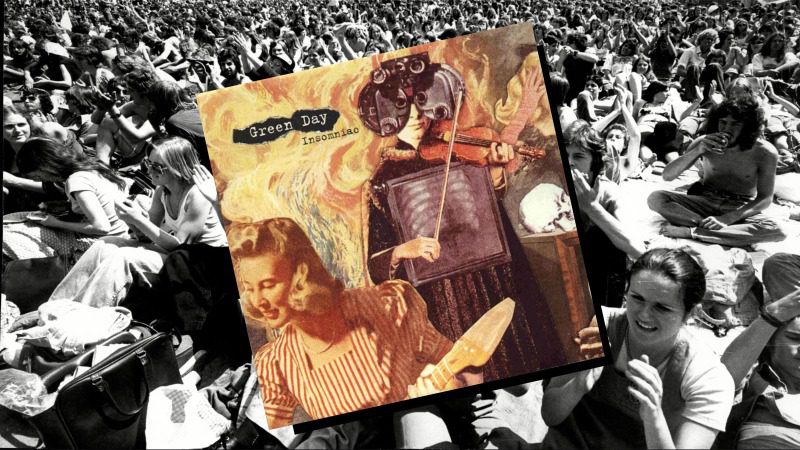To go to the underworld a mortal and return back the same, yet much, much different—this is not only the story of Orpheus and Eurydice, but of Scott Walker, who began his career as a teen pop idol in the 1960s and died as an icon of the avant-garde in 2019.
No one had a career like Scott Walker. His prolific output in the ’60s pushed the boundaries of what pop music could be, and his work from the late ’70s onwards moved further and further into the abstract. Yet it was never an easy road, as Walker slowly walked a trail littered with alcoholism, drug addiction, bad record deals and strenuous perfectionism. While he was able to overcome many of these demons, it was the perfectionism that haunted him throughout. Though mentally and emotionally taxing, it made him one of the greatest musical artists to ever walk the Earth.
An array of artists have cited Scott Walker as an influence including Radiohead, Jarvis Cocker, Holly Herndon, Bat for Lashes, Panda Bear, Brian Eno, Low, Alex Turner (Arctic Monkeys) and most famously, David Bowie, who served as the executive producer of the 2006 documentary about Walker’s life, Scott Walker: 30 Century Man. After discovering Walker via his ex-girlfriend, Bowie became obsessed with his work, calling him “his idol” during his 50th birthday special for BBC Radio One after hearing a message Walker recorded and sent to him. His impact on popular and avant-garde music, especially in the U.K., cannot be overstated.
With a career that encompasses everything from bubblegum, baroque, folk and country to new wave, art rock, avant-garde and opera, it’s almost impossible to condense his entire career into just a few songs. This list is only a taste of Walker’s brilliance, and amongst his prolific output, this is the music that speaks to us the most. From the handsomest pop star in the world to reclusive experimenter, here are the 15 best Scott Walker songs.
15. “The Sun Ain’t Gonna Shine Anymore”
Though originally recorded by Frankie Valli, this was the biggest hit of the Walker Brothers’ career and the one your grandma probably loved as a teen. But honestly, can you really blame her? With a rich arrangement that recalls the streets of a perfect Parisian block and Walker’s deep baritone dominating despite the “wall of sound” mix, it’s hard not to fall in love with Scott while listening to this song, even if we now know in retrospect there was a darkness lurking behind the teen pop facade.
14. “Track Three”
The sole entry from 1984’s Climate of Hunter, “Track Three” is an outlier on this list, as is the rest of that album in Walker’s discography. Climate is quite good, but while listening to this song, you’re hearing an artist between worlds. The dark undertones found on Nite Flights are all here, this time covered up by a sheen of ’80s new wave. Not only is it a fucking banger, but “Track Three” is also probably the last pure pop song Walker ever made.
13. “Jackie”
Between the breakup of the Walker Brothers and the beginning of his solo career in 1967, Walker was at an impasse. Sick of the pressures of fame and bandleading, he was ready to fade into the background. After a night out at a recently opened Playboy club in London, Walker went back to the apartment of a German “bunny” who, after drinking lots of Pernod, played him the records of Jacques Brel and translated some of his work to him. Soon after by chance, The Rolling Stones’ manager, Andrew Oldham, offered him his own translations of Brel’s work to sing, and the rest was history, as Brel’s fearless performances and lyrics about taboo subjects like sexually transmitted diseases, drunken escapades and infidelity were the skeleton key for the rest of Walker’s career. While “Jackie” wasn’t the first Brel cover Walker released, it’s probably his most well known, and easily his most fun. I mean, where else are you going to hear the phrase “in a stupid ass way” on a 1960s pop song?
12. “Brando”
Remember when I mentioned opera? This is the song I was thinking of, as the intro to “Brando,” the first track on his collaboration album with Sunn O))), features some of the best vocals in Walker’s career, an impressive feat considering his six-decade-plus career. Working behind the signature drones of Sunn O))) and bullwhips by circus performer Peter Gamble, Walker’s tortured voice perfectly matches the song’s subject matter of sado-masochism in the filmography of Marlon Brando. I’m not sure whether Scott Walker loved singing about sado-masochism and torture, but it does pop up quite a bit in his music and this list.
11. “Fat Mama Kick”
Possibly the most underrated song in Walker’s career, “Fat Mama Kick” will leave you hunched in the fetal position with a cracked rib or two. With reverb-heavy vocals that sound like they were recorded in a prison cell, it’s so good to hear Walker this unbridled. Following years of alcoholism, shitty label contracts and other malaises, the sinister horns and dark soundscapes of track two on Nite Flights are such a perfect release of the dark energy that lurked beneath his output in the ’60s. That is until track four, which we’ll eventually discuss.
10. “‘See You Don’t Bump His Head”
After a year of begging, I finally convinced my station manager at my college radio station to give me my own show. Because he knew my tastes skewed towards the weird, he told me to try my best to keep the music as close to the station’s sound as possible. Considering that our sound was mainstream alternative music, I couldn’t keep that promise for very long, as towards the final hour of one of my first shows, I decided to throw this song on. At around 11:00 p.m., I thought my boss wasn’t awake. He was, and he didn’t sound too happy over the phone. It was worth it.
9. “Next”
Of all the Jacques Brel songs/translations Walker covered, “Next” might be a strange choice as the best, but this song is just so much fun. While Brel resembled a sweaty rat of a man, Walker was extremely handsome and was able imbue a sense of coolness into the works of Brel, even when this particular song covers gay panic/homophobia, gonorrhea and PTSD-induced nightmares. “Next” was also memorably used during a scene in last year’s Hustlers. Hey, remember when we could sit down in theaters and watch movies? Speaking of…
8. “The Seventh Seal”
“The Seventh Seal” should not work. Lyric-wise, it seems like one of Walker’s most lazily written songs, considering that it’s basically just the plot of the film of the same name. But it’s a well-written and well-performed summary of the Ingmar Bergman classic, all the more entertaining considering a funny tidbit from Scott Walker: 30 Century Man where Scott recalls being upset that no one in Europe wanted to talk about art house cinema, preferring to talk about the latest John Wayne movie instead.
7. “Shutout”
Eight years—that’s how long Scott Walker sat in limbo after 1970’s ‘Til the Band Comes In. He still released music after that album—a lot of it actually—but none of it was his. After a series of failed cover albums that didn’t chart, he reunited with the Walker Brothers in 1975 for the first time since their brief reunion in 1968 for a concert in Japan. While their single “No Regrets” did pretty well on the U.K. charts, that was about it, as the group was quickly and rightfully pigeonholed as a nostalgia act—that was until 1978’s Nite Flights. With their label about to fold, Walker told the rest of his bandmates to write whatever they wanted, as would he.
During Walker’s eight-year hiatus from original material, he was already respected as a songwriter and performer. Nite Flights put this respect into overdrive. No longer trapped in the shadows of his teen pop past, he was able to take his songs in a truly modern direction, fully bringing to light the dark subjects he learned about after discovering the works of Jacques Brel. While “Fat Mama Kick” beats listeners down into the fetal position, “Shutout” is that initial punch, as the boy of the past is now a man, and one with a serious dark streak at that.
6. “The Cockfighter”
It’s hard to imagine that the Walker we hear on Tilt is the same one who brought us Scott 1-4. An extremely fun scenario I like to imagine is listening to Tilt like the only Scott Walker music you heard was from Scott 1-3. You’d listen to “Farmer In The City” and think, “Wow, this man is much, much sadder than when I last heard him.” It’s definitely different, but not inaccessible. Then “The Cockfighter” comes on, and you begin messing with your stereo, wondering if the song is supposed to be that quiet or if your speakers are busted. After messing with the volume, you finally begin to hear Walker’s voice and immediately, you’re shaken as the loud industrial percussion kicks in. “The Cockfighter” could live and die on that initial shockwave, but it maintains this tension throughout, like you’re riding down a never-ending version of Willy Wonka’s Tunnel of Terror.
5. “Rosemary”
By this point in his career, Walker had proven his keen ability to transport listeners into the world of his music, but it was 1969’s Scott 3 that he was able to do this consistently with his own writing for almost an entire album, with “Rosemary” being one of the most devastating. At the time, Walker described this song as being “about a spinster who has had one fleeting love affair—with a travelling salesman, I know a girl like this who can’t break away from a domineering mother. Doomed to spend her life like that, I tried to capture some of this atmosphere.” And what an atmosphere he captures, including such minute details that bring this song to life, producing one of the most heartbreaking pieces of baroque pop ever put to wax.
4. “The Electrician”
With the gift of hindsight, we can clearly see “The Electrician” as the true midpoint for Scott Walker’s career, as the avant-garde soundscapes he was known for in his last 25 years first came through on this song. And yet, this is also Walker finally saying goodbye to his teen pop past, juxtaposing his past and future. Shrieking synths make way for lush string arrangements just as belching bass work fades into the background, and blissful Spanish guitars come into the mix. Once you realize this song is about a sadistic CIA agent torturing a poor subject, you realize those beautiful string arrangements and Spanish guitar work are only in the mind of this CIA agent, as the rest of the song reveals the dastardly work of what he calls a job.
3. “Epizootics!”
Scott Walker was born on January 9, 1943, making him one of the last members of the “Silent Generation.” While Walker never experienced the worst hardships of the Great Depression and would have no personal memories of the events of World War II, the trauma of these events still loomed large. Walker grew up in the shadows of the Beat Generation, with the song’s title and nonsensical lyrics being largely inspired by the beatniks he idolized when he was young. Their interest in epizootics seemingly had nothing to do with their curiosity of animal epidemics, but just that it was a topic of eccentric coolness, which fit right in with Walker’s suave yet bonkers aesthetic. Despite the song being largely absurd and featuring Walker’s most deranged lyrical content, it just works. And why? Because this song just sounds cool. From the jazz-inspired drum breaks and cymbal crashes, to the vibrating tubax and shimmering electronics, it’s insane that a man pushing 70 was still breaking new ground, delivering an intense experience that gives me goosebumps every time.
2. “It’s Raining Today”
In a Skype chat in 2016 with a number of my close friends who I did a podcast with (and still do!), my friend Jeremiah brought up an artist named Scott Walker. I asked about him, and Jeremiah told me to listen to Scott 3 immediately—so I did. And since then, its opening track “It’s Raining Today” has remained not only one of my favorite Scott Walker songs, but one of my favorite songs of all time. Those opening string sections. That methodical bass. Those shimmering chimes. That voice. God, that fucking voice. 2016 was becoming a very melancholic year for me at that point, and this song just hit me like a brick. To make a long story short, “It’s Raining Today” is where my journey with Scott Walker began, and without it, I don’t know where I’d be.
1. “Clara”
By the time of 2006’s The Drift, Walker had mastered the ability to write about extremely grim subjects with a deft hand. “Clara” is one of his most disturbing tales yet, all the more horrific because it’s a real story. It was named after Claretta Petacci, the mistress of Benito Mussolini, who was shot, killed and further humiliated alongside him while their dead bodies were hung upside down in Piazzale Loreto. Not only does this song deal with the brutal execution of this woman, it also writes from the perspective of her last days—days she could have avoided if she never fell for the allure of Mussolini and fascism at large.
Described by Walker himself as a “fascist love song,” the song was inspired by seeing Mussolini and Petacci executed in old news reels at the cinema as a young boy, which gave him nightmares. A lot of Walker’s music is informed by trauma, with each of his subsequent albums picking deeper into this specific trauma. The reality of these events begin to surface lyrically and most importantly, musically. Meat punching, strings that sound like WWII bombers, violent woodwinds, tape distortion and so many more alarming sounds come in and out of the song’s 12-minute duration, all held together by possibly Walker’s greatest performance. He was able to convey the evils of fascism and an empathy for the song’s titular character with just his voice. Yet the song’s best moment is when the mix completely cuts out about six-and-a-half minutes in, leaving only the aforementioned tape distortion and meat punching, as guest singer Vanessa Contenay-Quinones sings the following passage from the perspective of Petacci:
Sometimes I feel like a swallow
A swallow which by some mistake
Has gotten into an attic
And knocks its head against the walls in terror
It’s a minimal, but extremely violent moment, placing the listener in Piazzale Loreto in Milan on April 29, 1945, witnessing the bodies of Mussolini, Petacci and other horrific fascists being humiliated. It also places you just a few days prior, right before Petacci and Mussolini were captured. While Mussolini made plans for her to escape, she stuck with him. Walker attempted to explain this allure in a 2006 interview:
Then, more than a decade ago, I read a biography and I thought this is an incredible love story. She was like someone today: she was celebrity obsessed. There were pictures all over her walls, especially of him because he loved this sort of thing: being in the press, doing these sort of poses and things. In a sense, she was a bit of an airhead. I remember my parents and people talking about Hitler and Mussolini, they thought they were sort of comic characters: the way they looked and everything. He was essentially kind of a dangerous clown.
It’s clear from that last part that there are serious parallels between Mussolini and President Donald Trump, making this song as relevant as ever. We are doomed to repeat history if we do not learn from it, and learning from it in this instance requires a long hard look at the social and economic factors that led to the rise of Mussolini and fascism around the world.




